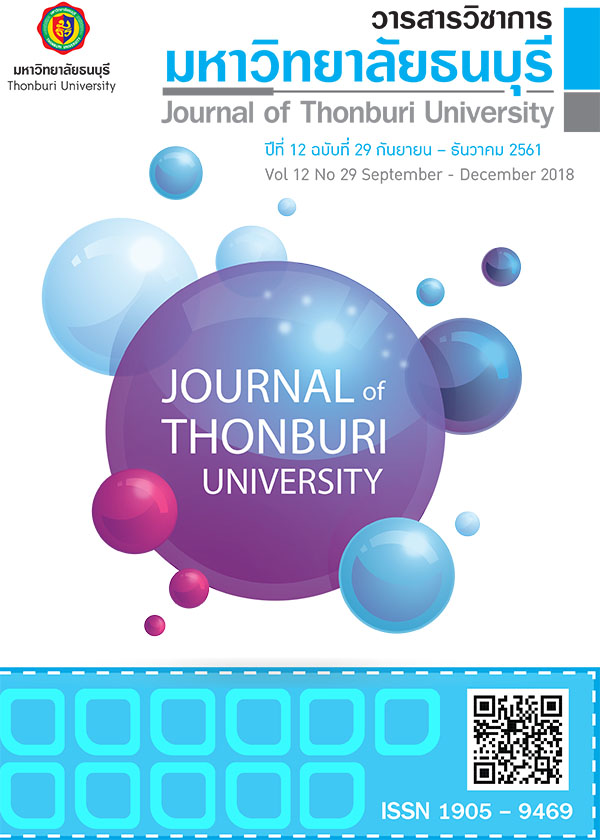THE INFLUENCES OF JOB CHARACTERISTICS AND QUALITY OF WORKING LIFE TO SERVICE EXCELLENCE BY CAREER COMMITMENT OF HOTEL CLERK IN HUA HIN DISTRICT
Main Article Content
Abstract
Abstract
The purpose of this research is to 1) study job characteristics were positively influences to career commitment 2) study quality of working life were positively influences to career commitment 3) study career commitment were positively influences to employee attributes desired by the modern organization and 4) study employee attributes desired by the modern organization were positively influences to service excellence. Data were collected from 280 hotel employees in Hua Hin district in 2016. The sample was sampled using the Taro Yamane and included 150 persons. The instrument was a questionnaire. The data were analyzed by using frequency, percentage, mean, standard deviation, pearson's correlation coefficient, regression analysis and multiple regression analysis. The results indicated that job characteristics and quality of working life influences to career commitment. The results also shown that the affective commitment had a mediating effect on the relationship between job characteristics, quality of working and employee attributes desired by the modern organization, service excellence. The results of this research used to develop a hotel in Hua Hin to excellent service in the future. Finally, the implication of the finding and suggestions for future research are presented.
Keyword: Job characteristics, Quality of working life, Service excellence, Career commitment
Article Details
References
ชาญชัย อาจินสมจาร. (2555). พฤติกรรมในองค์การ. กรุงเทพฯ: ศูนย์สื่อเสริม.
เชี่ยวชาญ อาศุวัฒนกูล. (2550). มิติใหม่ของการบริหารงานบุคคลในภาครัฐบาล. กรุงเทพฯ: โอเอสพรินติ้งเฮ้าส์.
ณัฏฐพันธ์ เขจรนันทน์. (2551). พฤติกรรมองค์การ. กรุงเทพฯ: วี.พริ้นท์ 1991.
ธีราภัทร ขัติยะหล้า. (2555). คุณภาพชีวิตการทำงานกับความผูกพันต่อองค์การของบุคลากรองค์การบริหารส่วนตำบลป่าสัก อำเภอเมืองลำพูน. เชียงใหม่: มหาวิทยาลัยนอร์ท-เชียงใหม่.
นรุตม์ พรประสิทธ์. (2554). ความสัมพันธ์ระหว่างคุณลักษณะของงาน ความพึงพอใจในการตอบสนองความต้องการพื้นฐานทางจิตใจตามทฤษฎีการกำหนดด้วยตนเองและความผูกพันในอาชีพ: กรณีศึกษาบริษัทกลุ่มธุรกิจพัฒนาอสังหาริมทรัพย์. กรุงเทพฯ: มหาวิทยาลัยธรรมศาสตร์.
บุญแสง ชีระภากร. (2553). การปรับปรุงคุณภาพชีวิตการทำงาน. กรุงเทพฯ: ห้างหุ้นส่วนจำกัด บางกอกบล๊อค.
ประคัลภ์ ปัณฑพลังกูร. (2556). เงินเดือนพนักงาน เป็นค่าใช้จ่ายหรือเป็นการลงทุน. สืบค้นเมื่อ 5 กุมภาพันธ์ 2556, จาก http://prakal.wordpress.com
ประนอม ตั้งปรีชาพาณิชย์. (2555). คุณลักษณะของพนักงานบัญชีที่พึงประสงค์ตามทัศนะของสถานประกอบการ ศึกษากรณีสถานประกอบการในนิคมอุตสาหกรรมจังหวัดสมุทรสาคร. นครปฐม: มหาวิทยาลัยเทคโนโลยีราชมงคลรัตนโกสินทร์.
ปรียาพร วงศ์อนุตรโรจน์. (2554). จิตวิทยาการศึกษา. กรุงเทพฯ: ศูนย์สื่อเสริมกรุงเทพมหานคร.
พะยอม วงศ์สารศรี. (2553). องค์การและการจัดการ. กรุงเทพฯ: สุภาการพิมพ์.
เพ็ญศรี วายวานนท์. (2552). การจัดการทรัพยากรคน. กรุงเทพฯ: โรงพิมพ์จุฬาลงกรณ์มหาวิทยาลัย.
วิทูล พุกภู่. (2553). การจัดการสมัยใหม่. กรุงเทพฯ: เสมาธรรม.
สมพงษ์ เกษมสิน. (2556). การบริหารงานบุคคลแผนใหม่. กรุงเทพฯ: ไทยวัฒนาพานิช.
สมาคมโรงแรมไทย. (2559). สืบค้นเมื่อ 26 เมษายน 2560, จาก http://www.thaihotel.org.
สมิต สัชณุกร. (2550). การบริหารงานบุคคลแผนใหม่. กรุงเทพฯ: ไทยวัฒนาพานิช.
สร้อยตระกูล อรรถมานะ. (2550). พฤติกรรมองค์การ ทฤษฎีและการประยุกต์. กรุงเทพฯ: โรงพิมพ์มหาวิทยาลัยธรรมศาสตร์.
สุพานี สฤษฏ์วานิช. (2552). พฤติกรรมองค์การสมัยใหม่: แนวคิดและทฤษฎี. กรุงเทพฯ: โรงพิมพ์ มหาวิทยาลัยธรรมศาสตร์.
สุมินทร เบ้าธรรม. (2554). ความสัมพันธ์ระหว่างการรับรู้คุณค่าของงาน ความผูกพันในวิชาชีพและคุณลักษณะของพนักงานที่ต้องการของผู้สอบบัญชีภาษีอากรในประเทศไทย. สกลนคร: มหาวิทยาลัยเทคโนโลยีราชมงคลอีสาน วิทยาเขต สกลนคร.
Christopher, H. (1996). Services Marketing. New Jersey: Prentice Hall, Inc.
Hackman, J.R. & Oldham,G.R. (1980). Work redesisn. Masachuserrs: Addison–Wesley Publishing Company.
Huse, E.F. & Cumming, E.A. (1985). Behavior in Organization: A Systems Approach to Managing. New York: West Plublishing Company.
Meyer, J.P. (1993). Commitment to Organizations and Occupations: Extension and Test Three Component Conceptualization. Journal of Applied Psychology. 78(4):538-551.
Scarpello V. (1994). A Longitudinal Assessment of the Determinant Relationship Between Employee Commitments to the Occupation and the Organization. Journal of Organizational Behavior. 15: 535-547.
Schaufeli, W.B. (2002). The measurement of engagement and burn out: A two-sample confirmatory factor analytic approach. Journal of Happiness Studies, 3, 71-93.
Yamane, Taro. (1973). Statistics: An Introductory Analysis. 3rded. New York: Harper and Row Publications.
Translated Thai References
AjinSomjair, Chanchai. (2012). Behavior in organization. Bangkok: The Media Center. (in Thai)
Arsuwatnakun, Cheowchan. (2012). A new dimension of human resource management in the government sector. Bangkok: OS House Publishing (in Thai).
Autmana, Souytakoon. (2007) Organizational Behavior. Theory and application. Bangkok: Thammasat University. (in Thai)
Bountum, Sumintorn (2011). The relationships between perception of job meaningfulness, professional commitmnet, and professional organizational citizenship behavior of tax auditors in Thailand. Sakonnakhon: Rajamangala University of Technology Isan Sakonnakhon Campus.(in Thai)
Cheraparkorn, Boon Saeng. (2010). Improving the quality of working life. Bangkok: BANGKOK BLOCK. (in Thai)
Kasemisin, Sompong (2013). New Personnel Management. Bangkok: Thai Wattana Panich. (in Thai)
Khattiyala, Teeraphat. (2012). Quality of working life and organizational commitment of the personnel officers in Pasak Subdistrict Administrative Organization, Mueang Lamphun District. Chiangmai : North Chiangmai University. (in Thai)
Kjornkull, Nuttapan. (2008). Organization Behavior. Bangkok: VIN PRINT 1991. (in Thai)
Pantpalangkoon, Prakal. (2011). Employee salaries are costly or investment. Retrieved February 5, 2011. http://prakal.wordpress.com (in Thai)
Pookpu, Vittun. (2010). Modern Management. Bangkok: Sermon. (in Thai)
Pornprasit, Narut. (2011). Relationship between job characteristics Satisfaction of basic psychological needs according to self-determination theory and professional commitment: Case study of real estate development firms. Bangkok: Thammasat University. (in Thai)
Sakeenwaneet, Suphanee. (2009). Organizational Behavior: Theory and Theory. Bangkok: Thammasat University. (in Thai)
Sannukorn, Samit (2007). New Personnel Management. Bangkok: Thai Wattana Panich (In Thai)
Srivivanont, Pensri. (2009). Human Resource Management. Bangkok: Chulalongkorn University Press. (in Thai).
Swandarom, Jira. (2007). Consumer behavior. Bangkok: Bachelor's Degree. (in Thai)
Thai Hotels Association. (2016). Retrieved April 26, 1960. http://www.thaihotel.org. (In Thai)
Thangpreecharparnich, Pranom (2012). The Favorable Characteristics and Qualifications of Accounting Staffs Preferred by Enterprises A Case Study of the Samutsakorn Industrial Estate. Nakhonprathum: Rajamangala University of Technology Rattanakosin. (in Thai)
Wong Anutroj, Piraporn. (2011). Educational Psychology. Bangkok: Bangkok Media Center. (in Thai)
Wongsatsi, Payoum (2010). Organization and management. Bangkok: Supak Printing. (in Thai)

